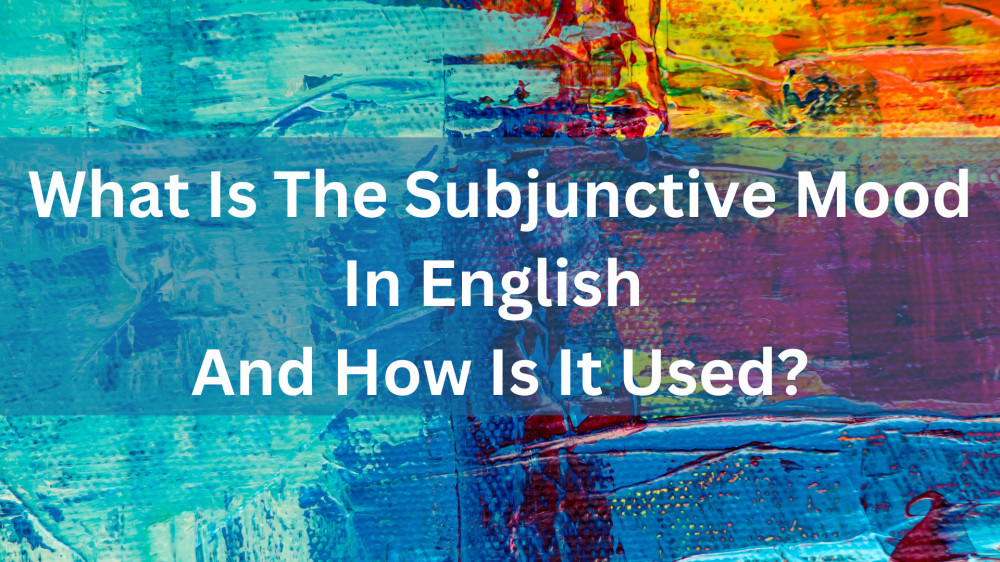
Many pupils in Year 6 will have been introduced to the subjective mood and how it is used. Here is an introduction for you.
What is the Subjunctive Mood?
The subjunctive mood is a grammatical concept that expresses various states of unreality such as wishes, doubts, and possibilities. In English, the subjunctive mood is typically formed using the base form of the verb (the form of the verb without “s” at the end) for all persons.
There are three main uses of the subjunctive mood in English:
1. To Express Hypothetical Situations
The subjunctive mood is used to talk about hypothetical situations or conditions that are contrary to fact or unlikely to occur. For example:
- If I were rich, I would travel the world.
- If she knew how to swim, she would go to the beach more often.
In these examples, the speakers are talking about situations that are not true or not likely to happen. The use of the subjunctive mood here is a way to express a hypothetical or imaginary situation.
2. To Express Wishes, Suggestions, or Demands
The subjunctive mood can also be used to express wishes, suggestions, or demands. For example:
- I suggest that he study harder.
- I wish I were taller.
- It’s important that he be on time.
In these examples, the subjunctive mood is used to express a desire or requirement, rather than a statement of fact. The use of the subjunctive mood here is a way to express a degree of uncertainty or doubt.
3. To Express Doubt or Uncertainty
Finally, the subjunctive mood can be used to express doubt or uncertainty. For example:
- I doubt that he be able to finish the project on time.
- It’s unlikely that she arrive on time.
In these examples, the speakers are expressing doubt or uncertainty about the situation. The use of the subjunctive mood here is a way to express a lack of confidence in the statement.
How to Use the Subjunctive Mood in English
So how do you actually use the subjunctive mood in English? Here are a few guidelines to keep in mind:
1. Use the Base Form of the Verb
In the subjunctive mood, you always use the base form of the verb, regardless of the subject. For example:
- If I were you, I wouldn’t do that.
- If she were here, she would help us.
Notice that the verb “be” is used in its base form (“were”), even though the subjects are “I” and “she.” This is because the subjunctive mood always uses the base form of the verb.
2. Use “If” Clauses for Hypothetical Situations
When you’re using the subjunctive mood to express hypothetical situations, you’ll typically use “if” clauses. For example:
- If I had more money, I would buy a house.
- If he were taller, he could be a basketball player.
Notice that the verbs “had” and “were” are used in their base form in these sentences, even though they’re in the past tense. This is because the subjunctive mood is not tied to a particular tense.
3. Use Special Verbs for Wishes, Suggestions, and Demands
When you’re using the subjunctive mood to express wishes, suggestions, or demands, you’ll often use special verbs such as “suggest,” “insist,” “recommend,” “wish,” and “demand.” For example:
- It’s important that she be here on time.
- I suggest that he speak with his supervisor.
- I wish that I had more free time.
Notice that the verbs “be,” “speak,” and “had” are in their base form in these sentences, even though they’re being used in the present and past tenses. This is because the subjunctive mood always uses the base form of the verb.
4. Use Indicative Mood for Statements of Fact
It’s important to remember that the subjunctive mood is used for expressing doubt, uncertainty, and hypothetical situations. When you’re making statements of fact or reality, you’ll typically use the indicative mood. For example:
- She is a doctor.
- He works at the hospital.
- I have three children.
In these examples, the indicative mood is used to express statements of fact or reality, and therefore the verbs are conjugated normally.
Why the Subjunctive Mood Matters
So why does the subjunctive mood matter in English? While it’s true that many native English speakers don’t use the subjunctive mood regularly, it’s still an important concept to understand for a few reasons:
1. Clarity of Communication
Using the subjunctive mood can make your writing or speech clearer and more precise, particularly when expressing hypothetical or uncertain situations. For example, saying “If I were to win the lottery, I would travel the world” is clearer and more precise than saying “If I win the lottery, I will travel the world.”
2. Formality and Politeness
In some contexts, using the subjunctive mood can make your writing or speech more formal and polite. For example, using “It’s important that he be on time” instead of “It’s important that he is on time” can be seen as more polite and formal.
3. Correctness and Accuracy
Finally, using the subjunctive mood correctly can help you communicate more accurately and effectively in English. While it may not be essential in everyday conversation, it’s an important concept to understand if you want to communicate precisely and accurately in more formal contexts, such as academic writing or professional communication.
Conclusion
The subjunctive mood is a grammatical concept that expresses hypothetical, uncertain, or doubtful situations. In English, it’s typically formed using the base form of the verb, and is used to express a range of emotions, desires, and requirements. While it may not be essential for everyday communication, understanding the subjunctive mood can help you communicate more precisely, accurately, and politely in a range of contexts.